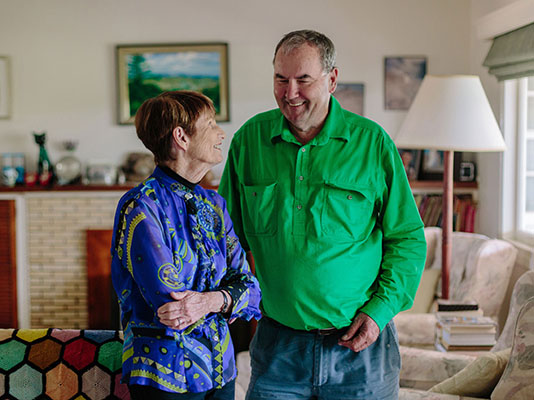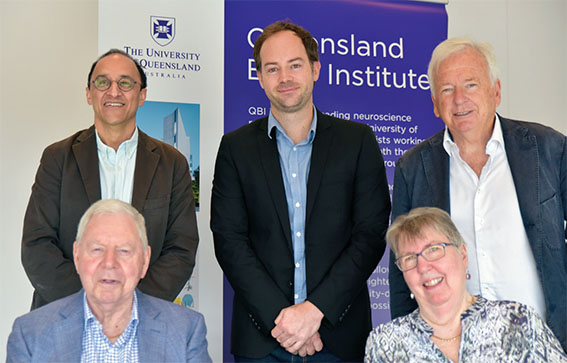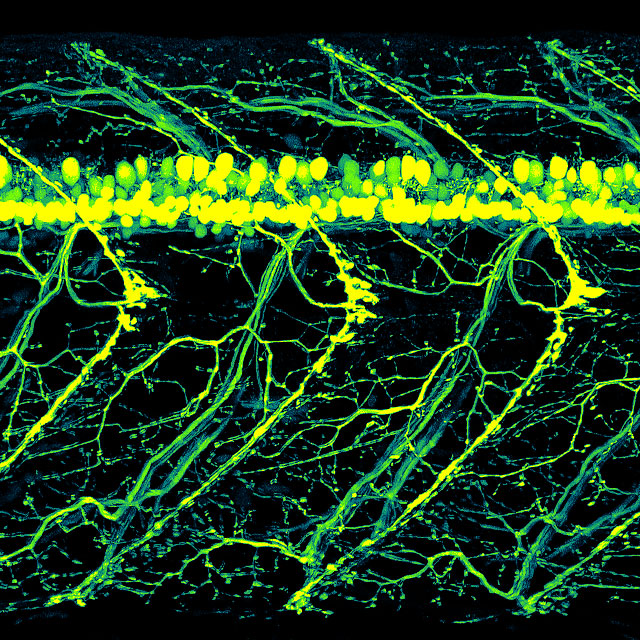The diseases we research impact people's lives
Our researchers are dedicated to improving lives through neuroscience. Thanks to the generosity of all our donors, that we can continue our legacy of ground-breaking research.
Brazil Family Foundation

Recognising stroke and motor neurone disease (MND) had only limited treatment options and no cures prompted Lyn and Bobbie Brazil to establish the Brazil Family Program for Neurology in 2017. This enabled us to recruit world-leading researchers and support four laboratories.
Dr Adam Walker’s laboratory has defined some of the early triggers of MND to enable the best targeted approaches for therapies and identified ways to prevent the abnormal accumulation or improve the removal of a protein that causes motor neurons to die.
Dr Tara Walker is examining whether the dietary supplement selenium can prevent or decrease cognitive or motor deficits following stroke.
Dr Matilde Balbi aims to understand how stimulating the cortex in different ways reduces the loss of brain cells after a stroke and whether this mitigates behavioural deficits.
Professor Gail Robinson’s stroke research aims to improve cognitive assessment tests used to evaluate stroke survivors, in the acute phase, to predict long-term outcomes and to develop more targeted, personalised therapy strategies. Professor Robinson also aims to improve our understanding of the biological basis of MND.
The Brazil Family have also donated generously to our Alzheimer’s disease research. This gift contributed to Professor Jürgen Götz and his team’s ground-breaking therapeutic ultrasound approach to target dementia. This research has identified a range of potential applications for ultrasound, including delivering drugs into the brain. The intention is to modify disease progression and ultimately cure brain diseases.
Discovery research leads to the health outcomes of the future, but it takes time and support. Researchers need preliminary data to support their applications for grants. With government grant funding becoming harder to secure , scientists with promising research potential are being lost.
Funding of researchers who narrowly miss out on government grant funding could hold the key to major breakthroughs and, with support, could continue to explore new avenues and build the data needed to be successful in subsequent grant rounds.
The Brazil Family Foundation understands the power of “near-miss” applications and are supporting our scientists with a gift which enables them to continue collecting valuable data to improve their grant success in future funding rounds.
The whole of the QBI community pays tribute to the Brazil Family Foundation whose generosity and support enables us to continue our pathway to expanding our understanding of the brain, the underlying causes of brain disease and help develop new treatments which will benefit the community at large.

Great Ocean Walk, raised over $125 000 to support
brain research.
NFIA Trekkers do the hard yards for QBI
Through the hard work of Brian Davies, a successful businessman and immediate past-president and patron of the National Fire Industry Association (NFIA), and his wife, Liz, QBI was the joint-recipient of a donation of over $250 000 in 2019.
This incredible effort was the result of the NFIA Patron’s Walk held in October, which may sound like a scenic walk in the park but Brian, Liz and seven other NFIA members spent three days enduring driving rain and winds of close to 50 knots coming straight from Antarctica.
The idea for the walk came while the couple were completing the Three Capes Walk to raise money for the Queensland Brain Institute in 2018.
On that walk, Liz suggested to Brian that as the patron of the NFIA, he could create his own walk for charity. Mr Davies believes that corporate Australia has a big responsibility to give back, which is testament to the success of the inaugural walk. The money raised was shared between the Queensland Brain Institute and the Gallipoli Medical Research Foundation (GMRF).
The NFIA walk is the first of three walks to raise money for research at QBI and GMRF, with the aim of raising $500 000 in three years. The donation from the NFIA walk will help QBI’s research into motor neurone disease, dementia, Parkinson’s disease, stroke and QBI’s Discovery Research Endowment fund, which enables fundamental research into major health issues, including depression, anxiety, PTSD and epilepsy. QBI is extremely grateful to Brian and Liz and the NFIA team for their support.
The NFIA walk is the first of three walks to raise money for research at QBI and GMRF, with the aim of raising $500 000 in three years.
The Stafford Fox Medical Research Foundation

(QBI Director) and Dr Steven Zuryn and Emeritus Professor Perry Bartlett AO (back row).
In 2019, The Stafford Fox Medical Research Foundation confirmed its continued generous support of the prestigious $2.5 million philanthropically funded international fellowship to Dr Steven Zuryn at the Queensland Brain Institute to fight stroke-induced dementia, also known as vascular dementia. The Foundation also continues to support the work of Emeritus Professor Perry Bartlett’s research into prevention of dementia in ageing by improving cognition through exercise.
The Stafford Fox Medical Research Foundation was established in 2013 following the death of Moyna Fox, and named in honour of her late husband, James Stafford Fox, a former BP Australia chief executive.
Stafford and Moyna Fox started one of Australia’s wealthiest medical research foundations after many years of careful planning, resulting in a fund worth over $100 million. It was only publicly revealed in Moyna’s will when she died in 2013, many years after her husband.
James Stafford Fox was a private person, tall, physically imposing, but without a, particularly dominant personality. He rose from a position as a junior clerk at the Port Melbourne depot of the Commonwealth Oil Refineries (COR) in 1932, to become the first Australian chief executive of BP Australia Ltd in 1971.
James Stafford Fox spent three years at the helm of BP Australia, and retired in 1974 at age 60, remaining on several boards until 1985. By 1990, he was in poor health, suffering, among other things, from dementia. He entered a nursing home and died in 1994. By that time, he had already charted the course that would lead to the establishment of the foundation. Moyna lived on for more than 18 years, knowing what would happen after her death, but never revealing it publicly. Eventually, she too succumbed to dementia and died in 2013. The couple, who were so careful with their money and who clearly had no desire for fame and prominence during their lifetime, will now forever be remembered for their generosity in setting up the Stafford Fox Medical Foundation.
The Foundation’s support of QBI is crucial in enabling Emeritus Professor Bartlett and Dr Steven Zuryn to continue their work in finding solutions for the growing challenge of dementia today. This cutting- edge research is helping put Queensland and Australia at the forefront of world medical research.
What your donations fund
Your support can help us achieve a range of achievements

World leading research

Brightest scientific minds

Solutions to global health challenges
"I think it is important for people with dementia, their families and carers, to know that they are not forgotten, and that there’s a lot of work going on behind the scenes at QBI to try to unravel the tangled web that is dementia."
– Robyn Hilton (established the Peter Hilton Senior Research Fellowship in Ageing Dementia)
Hear from one of our supporters
Jeff Maclean, Chair of QBI Advisory Board
Got a story you would like to share?
Are you a donor or supporter of QBI and would like to share your story? We would love to hear from you!
Research in action
- Postdoctoral Research FellowQueensland Brain Institute
Mowry: Psychiatric Genomics
Group Leader
Professor Bryan Mowry
Academic Title Holder - ProfessorQueensland Brain InstituteResearcher profile is public:1Supervisor:Researcher biography:Bryan is a graduate in medicine from the University of Queensland and holds a BA (Hons) degree in philosophy from the University of Western Australia. A medical specialist in psychiatry, he is a clinician researcher, who is Conjoint Professor at the Queensland Brain Institute, University of Queensland, and Director of Genetics at the Queensland Centre for Mental Health Research. His primary research interest is the molecular genetics of schizophrenia, and holds a MD degree (University of Queensland) in this field. Since 1990, he has conducted studies, with national and international collaborators, to identify susceptibility genes for this disorder. He is the recipient of grants from the Australian NHMRC and the US NIMH.
The primary research goal is to identify and functionally characterise susceptibility genes for schizophrenia and related disorders. A special focus is on the study of large collaborative samples and ethnically homogeneous populations. Key methodologies used in the lab include genome-wide association studies, next-generation sequencing, transcriptome profiling of post-mortem brain samples, neurocognitive and neuroimaging phenotyping and induced pluripotent stem cells.
Current areas of interest include pharmacogenomics of clozapine treatment response, whole exome sequencing focused on de novo mutations, and the neuroimmunology of schizophrenia
Body: Professor Bryan Mowry: Psychiatric genomics
Professor Bryan Mowry: Psychiatric genomicsOur primary research goals are (i) to identify susceptibility genes for schizophrenia and related disorders and (ii) understand both their normal and pathologic functions in the brain. To investigate these two broad areas of research, we use a wide range of methodologies and techniques ranging from high-throughput sequencing technologies, quantitative genetics, systems biology and deep learning, through to animal models and cutting-edge microscopy. Our research is organised into the following themes:
Current collaborations
- Dr Rangaswamy Thara - Schizophrenia Research Foundation (SCARF), Chennai, India
- Prof Matthew Brown - Diamantina Institute, The University of Queensland
- A/Prof Naomi Wray - Queensland Brain Institute, The University of Queensland
- Prof Peter Visscher - Queensland Brain Institute, The University of Queensland
- Prof David Reutens - Centre for Advanced Imaging, The University of Queensland
- Prof Lynn Jorde - University of Utah School of Medicine, Salt Lake City, Utah
- Psychiatric Genetics Consortium, Schizophrenia
- Molecular Genetics of Schizophrenia Consortium
- Australian Schizophrenia Research Bank
Research Members
Dr Jean Giacomotto
Honorary Senior FellowQueensland Brain InstituteResearcher profile is public:1Supervisor:Researcher biography:Dr Giacomotto, NHMRC Emerging Leader, is a young group leader focusing on translational research, genes and diseases, imaging/automatic systems, drug discovery, chemical biology, and medical applications. His work focuses on translating little discoveries made in a single cell or in a model organism to applications or treatments for humans. He has already made discoveries that benefit human health, such as treatment for muscular dystrophies. He is working with a wide diversity of models, including cell lines and mouse models, but he recently spent a lot of time working with the zebrafish model. He believes that this small fish will have an important impact on the seek of treatments for neuromuscular and neurological disorders. Those diseases are very difficult to reproduce in a single cell, making the search for chemical treatments difficult. This fish opens a new avenue for the screening of bioactive compounds and for understanding the progression of these terrible disorders. He believes in translational research, the zebrafish is for him a fantastic complementary model to cell lines in order to recapitulate human diseases and run large-scale experiments. He is working on developing future therapeutical strategies to alleviate the suffering of human patients.
Dr Giacomotto recently established his group at Griffith Research Institute for Drug Discovery (Discovery Biology, Griffith University) and remain an active honorary fellow of the Queensland Brain Institute (The University of Queensland). Dr Giacomotto is currently recruiting. Don't hesitate to contact him for further information.
Students
Ms Fangfei Guo
PhD StudentQueensland Brain InstituteResearcher profile is public:0Supervisor:- 8 Mar 2018International Women’s Day Discussion Followed By The Inaugural QBI Networking Lunch
Please join us on International Women’s Day for a lively discussion on “Whose responsibility is it to effect change?” Hear about challenges, accomplishments and what role organisations versus individuals play in effecting change.

